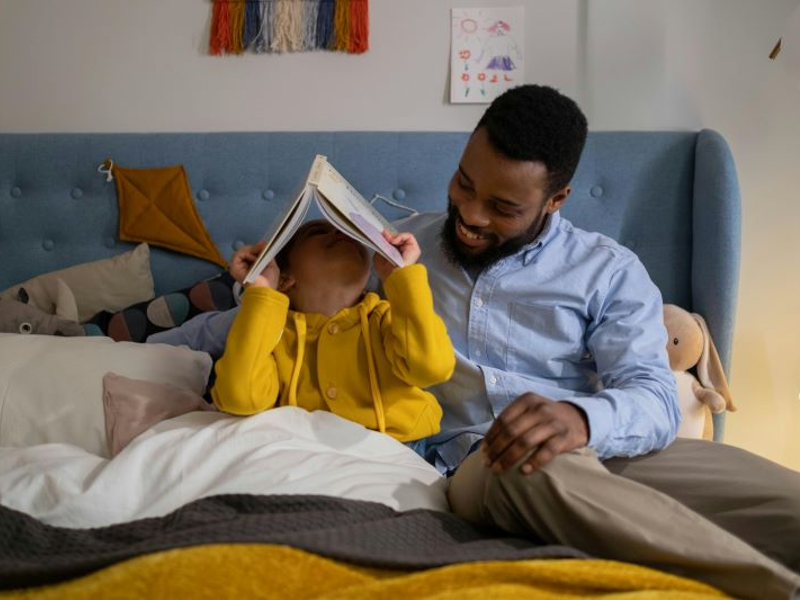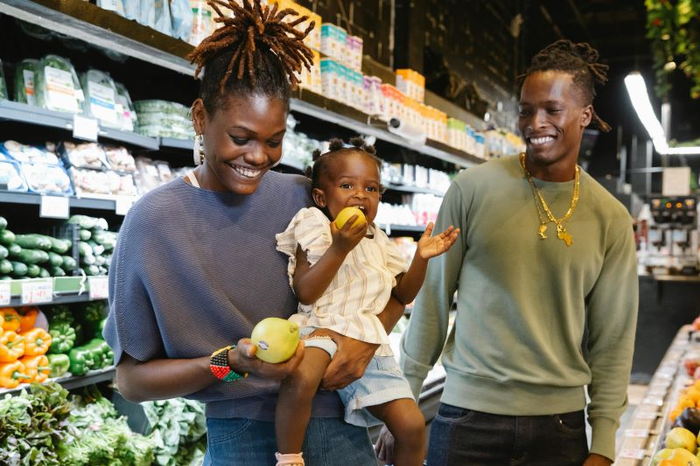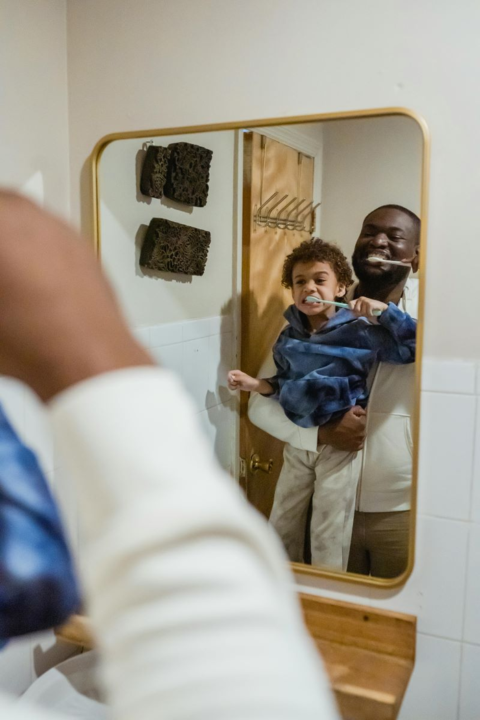
Photo by cottonbro studio
Once upon a time, fathers went to work and took care of the bills while mothers stayed home to raise children and kept the house spotless.
Fast forward to the 21st century, we are witnessing a shift. Dads are stepping up and redefining fatherhood in inspiring ways. Fatherhood in 2024 isn’t just about providing, it has gone beyond being seen as emotionless ATMs. In the modern family, dads are becoming more actively involved. Nurturing is no longer a “mom thing.” It’s a human thing.
A young widow once shared her pain online after her daughter failed a school assignment where she was asked who pays their school fees. According to the woman, the little girl has known her to play both father and mother roles since her dad’s passing, which was why she ticked “mother” as the answer. But the teacher marked her sincere answer wrong.
This was the role fathers played in the era of traditional fatherhood. Traditionally, fathers have been seen as the breadwinners, disciplinarians, and occasional playmates, while mothers have been cast as the primary nurturers and caregivers.
Modern Fatherhood: Challenging Traditional Stereotypes
Remember when the idea of being a father involved getting back from work and sitting in front of the television with legs crossed while mom handled everything else? Fast forward to today, and all that has changed as the role of fathers has evolved significantly, a different ball game from the times of our parents. In today’s ever-evolving society, fathers have got a whole new role. They are not just providers and disciplinarians. The modern-day father is more involved in the children’s lives, contributing to their emotional, intellectual, and physical development. They are more hands-on than their fathers. They take part in the diaper-changing, bedtime story, and they know their way around the kitchen. They do the school run and learn to plait their daughters’ hair.
These men are redefining traditional gender roles and paving the way for a more equitable future. Let’s take a look at some of the changing roles of the modern-day father in evolving family structures.
The rise of stay-at-home dads: More dads are opting to care for their kids full-time as women take on more challenges and excel in their careers, turning some of them into the bigger earners in their households. One in five stay-at-home parents are now fathers, a recent Pew Research Center study found.
Who says moms have the monopoly of staying at home to raise the kids? According to the Pew Research Center, an estimated 2.1 million fathers were stay-at-home dads in 2021—up 8% since 1989. Stay-at-home fathers are taking over as they proudly don the apron, showing the world that they can execute the role of primary caregiver. These men are proof that nurturing knows no gender.

Photo by Greta Hoffman
Fathers in blended families: As divorce rates rise, people find themselves in relationships where one or both partners have children from a previous marriage or relationship. Single parents form new households and those who have been through divorce find the courage to marry again. This new family type is often called blended families or stepfamilies. Divorced and step-fathers are navigating the complexities of blended families, building new bonds with stepkids while supporting their biological children. From attending school activities to helping with homework, these dads are redefining the traditional concept of family, proving that love knows no boundaries and extends beyond blood ties.
Gay fathers: There is a group of men who do not often feature in discussions about fatherhood: gay fathers. They operate outside traditional gender roles, proudly defying societal norms and embracing parenthood with open arms. These men are showing the world that there are different ways of being a father and having a family.
Shared parental responsibility: In a world where both parents are working hard, trying to make ends meet, it is only fair and practical for parenting responsibilities to be shared equally. Feeding, bath time, school pickups, doctor’s appointments, and other aspects of childcare are no longer solely a “mom thing.” Fathers today spend more than triple the amount of time caring for children as they did in the 60s. Parenting has become a more jointly shared venture by both adults in the home.
How Stereotypes are Harming Families
We may have come across some misconceptions and stereotypes about the role of dads in family. You may have heard some say dads are incapable of looking after the children on their own. I once heard a lady say she could never leave her kids alone with their dad because she would not have peace of mind. She believes he would not be able to take care of them. I have seen instances where mothers are out having fun and they keep getting questions like: “Who did you leave the baby with?” As if the baby does not have a father. I have also witnessed fathers who are babysitting their children getting asked ridiculous questions like “Where’s the mother? As if it is a crime for a man to babysit a child.
These stereotypes about the role of dads in the family can negatively impact the emotional well-being of both fathers and children. Stereotypes that portray dads as cold and emotionless can make them feel uncomfortable expressing affection, which may limit their interactions with their children.
Stereotypes that portray dads as sole providers may discourage fathers from taking on nurturing roles, preventing children from seeing the full picture of what fatherhood can be. This may harm the children, who miss out on the irreplaceable love, support, and emotional guidance a strong father figure provides.
When the burden of caregiving is placed solely on mothers, it can also lead to an unequal distribution of household and parenting responsibilities. Moms may feel overwhelmed and unsupported, and dads miss out on bonding time with the children.

Photo by Keira Burton from Pexels
Why do we Need Nurturing Fathers?
More men becoming involved in nurturing and caregiving roles with their children, redefining fatherhood. We need to move our thinking away from outdated stereotypes and embrace the diverse and vital roles dads play in today’s families. When men are included in childcare, both genders benefit. Men can enjoy better relationships with their children. On the other hand, women can participate more fully in the workforce, knowing the children are in capable hands. We need more fathers embracing nurturing roles as they play a crucial role in the growth and development of their children.
A nurturing father provides a safe space for children to express their emotions, setting the stage for them to develop the skills they need to manage their emotions and interact healthily with others throughout life.
A father who takes up nurturing roles gets to teach his child the importance of responsibility and accountability.
Fathers often engage in more physical play like riding bikes with their children. These activities can improve motor skills, coordination, and overall healthy physical development. They also engage in rough-and-tumble play with their children, encouraging exploration, problem-solving, and creativity.
Reports have it that children with involved fathers tend to perform better in school. A study led by the University of Leeds claims fathers have “a unique and important effect” on children’s educational outcomes. The study, which was funded by the Economic and Social Research Council, recommends that fathers should carve out as much time as they can to engage in playful and educational activities with their children each week.
By actively participating in their children’s lives, fathers help raise emotionally intelligent and socially skilled individuals who are prepared to scale life’s hurdles. From emotional well-being to setting the stage for academic and all-round success, fathers play a vital role in shaping their children’s futures.
Here are some practical tips on how families can break down stereotypes and create a more balanced parenting dynamic.
Dads should be encouraged to show more emotion. This will help children understand that emotional vulnerability is a strength, not a weakness.
Both parents can take up tasks like cooking, and cleaning, and actively participate in activities like bedtime routines, playing, and attending school events.
Normalize dads taking on traditionally “feminine” roles. For example, fathers can take on cooking and cleaning, while mothers handle DIY projects.
Show the children that both parents are responsible for nurturing, disciplining, and providing for the family through your actions. Embracing shared responsibilities allows for a more balanced and fulfilling family dynamic.
In the spirit of redefining gender roles, we need to advocate for policies that support equal parenting, such as parental leave for both parents. Also, consider splitting parental leave to allow both parents to bond with newborn babies.





